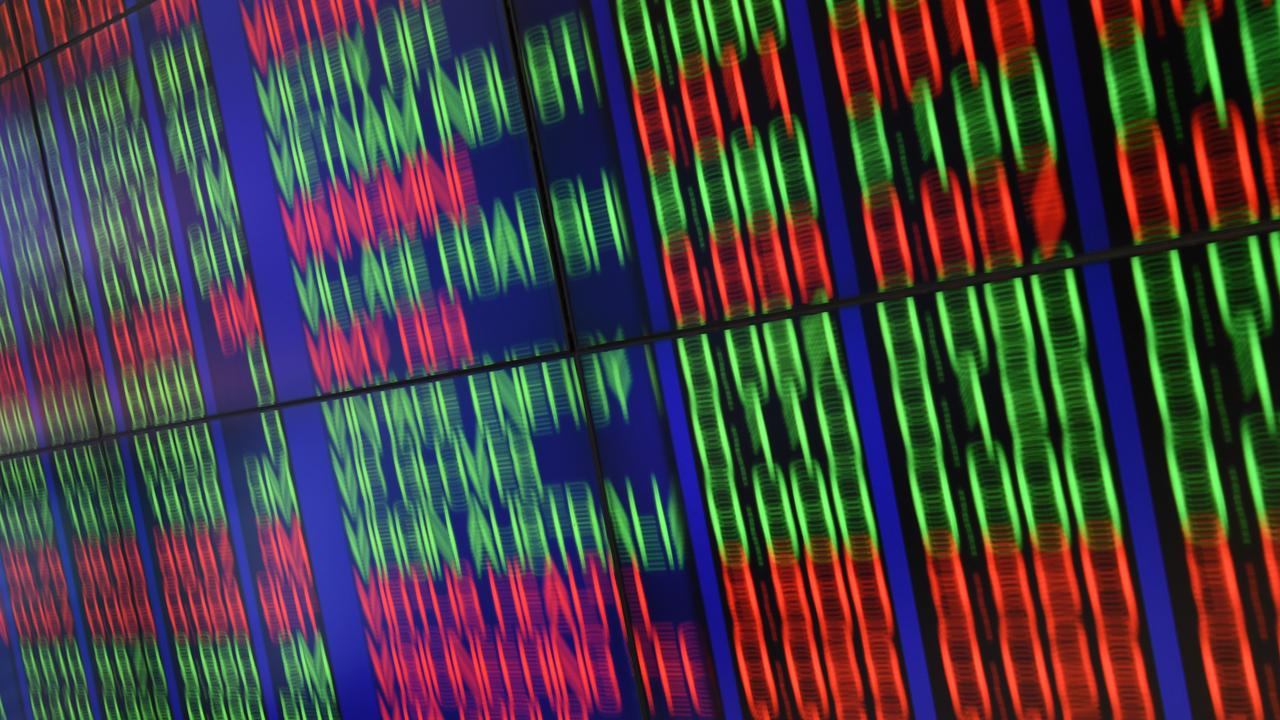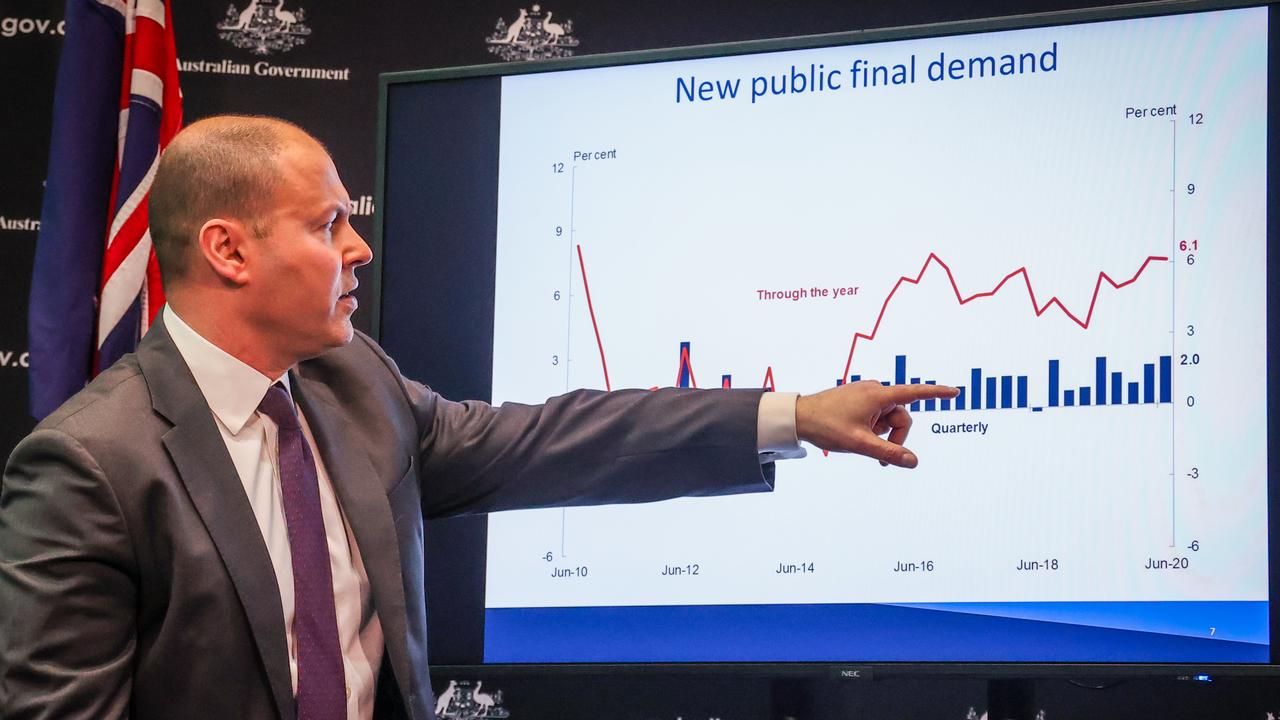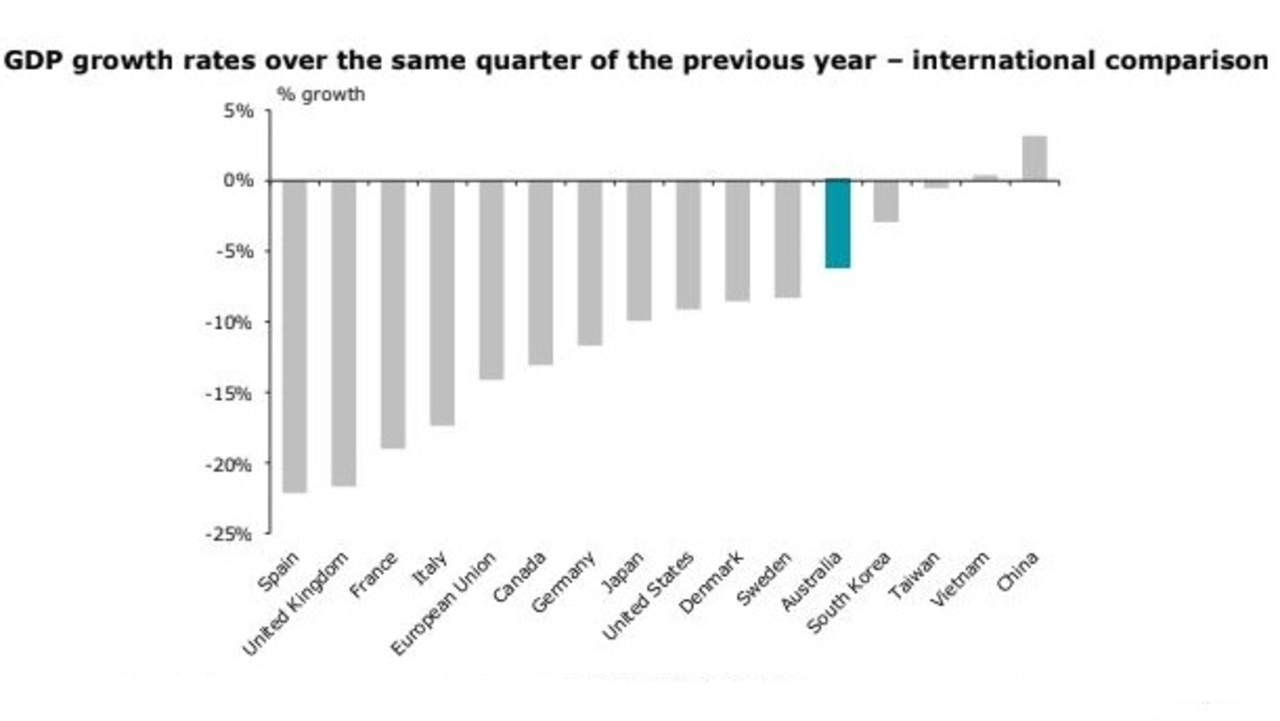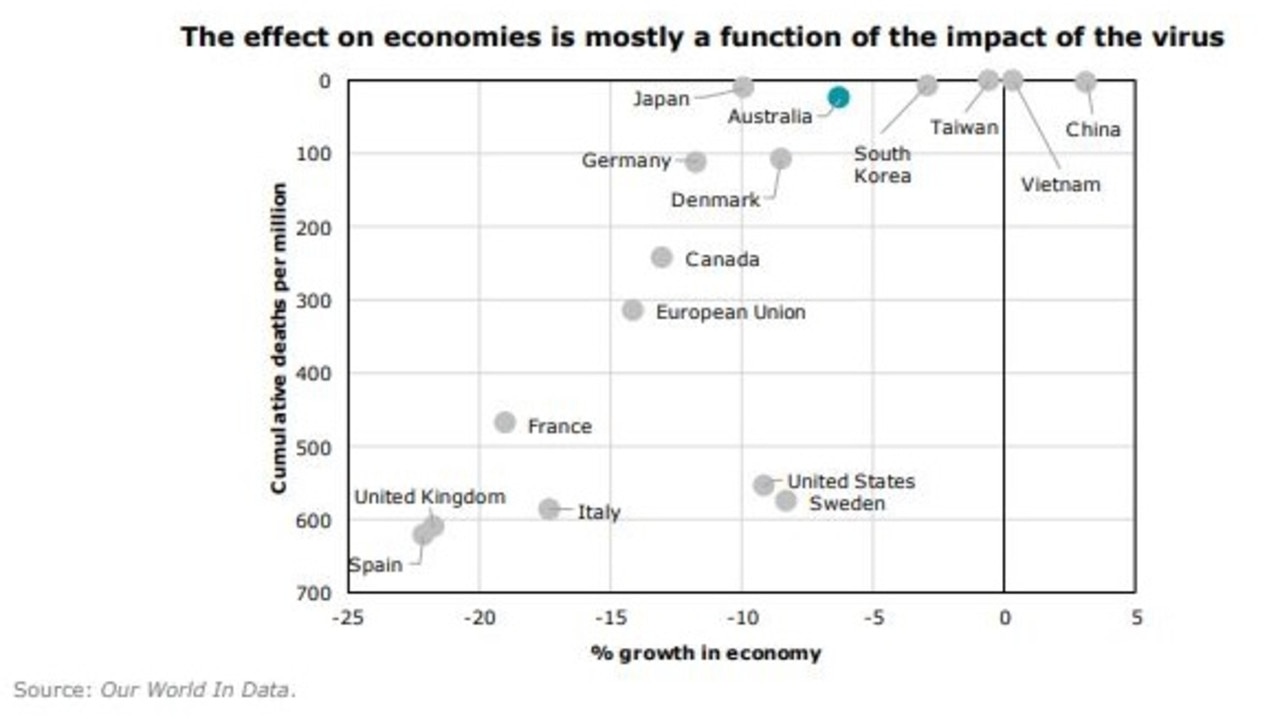Australia’s economy performing better than most amid pandemic, experts say
The Australian economic outlook is definitely “ugly” but how we’re dealing with the COVID recession is different to just about elsewhere due to one unique factor.

Australians have been “fighting for our lives” during the lethal coronavirus pandemic – and now, we’re also fighting for our livelihoods.
That’s the grim reality we’re facing, after the release of the June national accounts data on Wednesday revealed the catastrophic extent of the COVID-19 crisis.
The data painted a picture of an economic bloodbath, with the economy contracting by a staggering 7 per cent through the quarter.
Previously, the biggest drop was in 1974, when the Australian economy contracted by just 2 per cent in the June quarter.
It means we are now in the grip of our first recession in 30 years – amid the worst yearly growth contraction since WWII.
RELATED: How much you’ll save from tax cuts

The numbers are bleak, with Prime Minister Scott Morrison describing the situation as “heartbreaking” and Treasurer Josh Frydenberg warning the road ahead will be “long, hard and bumpy”.
But while there’s no denying our “ugly” circumstances and the toll it will take on employment, leading Australian economists are convinced there’s light at the end of the tunnel – and that we’re actually leaps and bounds ahead of most of the world for several key reasons.
BUDGET ‘FIGHTING FIT’
Deloitte Access Economics partner Chris Richardson told news.com.au we were “fighting for our lives and our livelihoods” as a result of the pandemic.
But he said the health of our budget before COVID-19 hit gave us a massive advantage.
“What is true for us and most other nations is that the key to helping livelihoods and the economy has got to come from governments,” he said.
“That means we’re going to run up debt, but Australia is unusual among the rich nations of the world as it went into this crisis with taxpayers who didn’t owe heaps.
“We’ve also been relatively successful in our fight on the health front, and so although debt has jumped, it has really only jumped to levels that most of the rich world had before we entered this crisis.”
RELATED: 400,000 more jobs may go by Christmas

Mr Richardson said the “blood, sweat and tears” that had gone into repairing the budget over the past decade and the reluctance over many decades to let it get out of control meant that we went into the pandemic “fighting fit”.
“Although we’ve taken some heavy hits, those hits have been able to be defended against better than most and have been smaller than most, which is good news for Australia,” he said.
SPEEDY STIMULUS
Another strategy that has placed us ahead of the most of the world was the speed and nature of government stimulus.
“Wednesday’s data shows that once it was game on, within a stunningly short period of time, we put money into the hands of families and businesses – so much so that they actually saved more than usual,” Mr Richardson said.
“Although this is the fastest-moving crisis Australia has ever faced, we got money into hands faster than we did during the GFC, and we did very well during the GFC.”
He said the type of money was also important, as nations that had experienced the lowest rise in unemployment were those that had opted for a wage subsidy like JobKeeper.
“I’m not saying it has been perfect, and some jobs we have protected won’t be there on the other side, but a bunch of jobs have been saved because of JobKeeper and JobSeeker,” he said.
Mr Richardson said our unemployment benefit was previously Australia’s “chink in the armour”, but that effectively doubling it during the crisis had also spared “hundreds of thousands” from the financial and psychological shock of surviving on just $40 a day.
“It’s incredibly important to rise to the moment and take care of Australia’s most vulnerable … and it was a great ‘we’re all in this together’ moment,” he said.
“We can say with pride one of the very first things we did was to try and take care of Australians already doing it the hardest and those about to do it hard.”
STRONG TRADING RELATIONSHIPS
AMP chief economist Shane Oliver agreed Australia was far better placed than others as we had “done a better job than other countries in terms of controlling the virus and protecting the economy, jobs, income and businesses”.
“You can see it in the fact the economy only contracted 7 per cent in the June quarter, while others fell a lot more,” he said.
And he said our trading relationship with China was another weapon up our sleeve.
“There are a lot of question marks, but we still have a strong trading relationship with China – China is leading a strong demand for our raw materials, and even though there have been some issues with wine and barley, they are a relatively small part of our exports,” Dr Oliver said.
“Outside of Victoria, we’ve seen a reasonably good recovery – people are out and about and spending, and that’s a good sign that most of Australia has already exited the recession.”
He said while it was “looking messy” for Victoria, every other state should record growth in the September quarter.
THE PROOF
Meanwhile, Mr Richardson said the proof of our success could be seen in two Deloitte Access Economics graphs.
“To be clear, it’s ugly – I’m not pretending it’s anything other than ugly here in Australia,” he said.
But he pointed to one graph that showed that only China, Taiwan, Vietnam and South Korea had been performing better than Australia economically before the crisis.
RELATED: Big losers in $1500 pandemic leave plan

“Everyone else is on the other side of that chart, and we have seen some horrendous outcomes,” Mr Richardson said.
He said a second chart, which compared economic growth with deaths and population, proved that “success against the virus means success with the economy”.
That graph also places Australia far above most, alongside Japan, South Korea, Taiwan, Vietnam and China.
RELATED: Secret truth behind Aussie recession

The combination of those two charts shows we’re leading most of the world.
“You would rather be us,” Mr Richardson said, adding that: “among nations we most usually compare ourselves to, we are an absolute frontrunner”.




